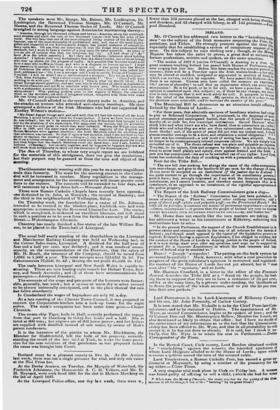IRELAND.
Mr. O'Connell has addressed two letters to the "hereditarylo* men " on the subject of the Irish measures respecting the Poor, es. porations, and Tithes. He strongly protests against the three hits, especially that for establishing a system of compulsory support of st poor. On this subject he says nothing new ; though, as the Mores Register has taken the pains to prove, a great deal at eremites lei former professions, written and spoken, on the same question, " The session of 1837 8 (writes O'Connell) is drawing to a close, sit great measure touching Ireland has passed both Houses of Parliament, and, now verging fast into law. Before this letter reaches the remoter parts of et country, there will be a Poor-law upon the Irish statute-book—a law van may be altered or modified, mitigated or aggravated in matters of detail, be which can NEVER, NEVER be repealed. We have passed the Rubicon fora there is no retreat. Unwise men have called the measure an experiment (ill ! excess of absurdity ! to call that an experiment which can never hay" termination ! He it for good, or be it for evil, we have a poor-law. Alyce' opinion is unaltered upon this subject ; or, if there be any change, my caGyi.. tion is only stronger that it will work solely for evil. It purports to be for the relief of the destitute poor. My opinion is, that it is a law to me, the destitute more miserable, and to increase the nurnbcr of the poor."
The Municipal Bill he denounces as an atrocious insult offeredts Ireland by the House of Lords-
" For three years, that admirable specimen of hereditary wisdom bad refuel to give us Reformed Corporations. It proclaimed, in the language of awn, guised contempt and unmitigated hatred, that the people of Ireland were us worthy of, or unfit for, free municipal institutions. Sacred Heaven ! whrnl think who and what rose are who have dared thus to calumniate us—wheal think who and what they are who are thus calumniated—my blood boils.-If heart throbs! and, if the spirit of peace did not visit my inmost soul, I slate almost consider revenge to be a duty, and retaliation a moral obligation! • • A new sera has commenced—a new mode of acting has been adopted. Win no longer to Ile contemptuously refused corporate reform. We are simply tots sreindkd out of it. The direct refusal was too plain and palpable an tojuatio, Toryism, in its nature, lives and prospers by delusion : it is too odious tom tinue to avow itself plainly and openly, even against Ireland and the Irish. A new tent has commenced—we are to be swindled nal of our rights: Lord Lys hurst has undertaken the duty of mocking ns wish a pretended reform."
Now for the Tithe Bill-
" The new bill does nothing bnt change the name of the tithe-cornposian into rent-charge, and give to the landlords 23 per cent. for the change of earns, it can never be accepted as an instalment of the justice due to Ireland. I am quite content to go through the experiment of its conciliatory power•if such it have; hut, strongly impressed as I am with the doctrine of aecepti% instalments, yet I cannot consider, and therefore cannot designate this as is instalment, or an approach to an instalment, of the rightful appropriationd the public proper ty. '
The Report of the Irish Railway Commissioners gets a slap-
" The Report of the ' Railway' Commission has just been published. 11 treats of every thing. There is, amongst other railway curiosities, half a page of direct puff plain and palpable poff—on the Provincial Banh.• Bat With alt its farrago, It contains one matter of portentous importance—it proves —listen, countrymen !—it proves that the people of Ireland are now in numbs EIGHT MILLIONS FIVE HUNDRED THOUSAND SOULS—ay, and bodies too."
Mr. Hume does not exactly like the turn matters are taking. He has addressed a letter to his constituents at Kilkenny, soliciting their instructions how to act-
" In the present Parliament, the support of the Church Establishment bias present extent and resources stands in the way of all reforms for the benefit of Ireland ; and though mush opposed to the repeal of the legislative powers as regards Ireland's haring a separate Leyislalare, I am obliged to confess, that the conduct of the Muse of Lords in denying justice to the people of Ireland, as it is now doing, must soon alter my opinions, and urge me to support hit proposal fat' a separate Legislature, in which the best interests sod hip. pittess of Ireland may be attended to."
Brava! " Joseph " a repealer ! The patting.on-the-back system hm answered beautifully ! Mark, however, with what a cool precision the progress of the great calculator's opinions is restrained and regulated: the conduct of the House of Lords has not yet altered, but it "
x.,on siter opinions,- sod so forth.
Mr. Sharman Crawford, in a letter to the editor of the Freeman's Journal, &so Ito:, the Tithe Bill as a " fraud on the people, by lead- ing them to suppose that they are to have a remission of .25 per cent, hilst at the same time, by a private understanding, the landlords are to fleece the people of the whole amanita, and to put the 25 per cent into their own pockets."


























 Previous page
Previous page